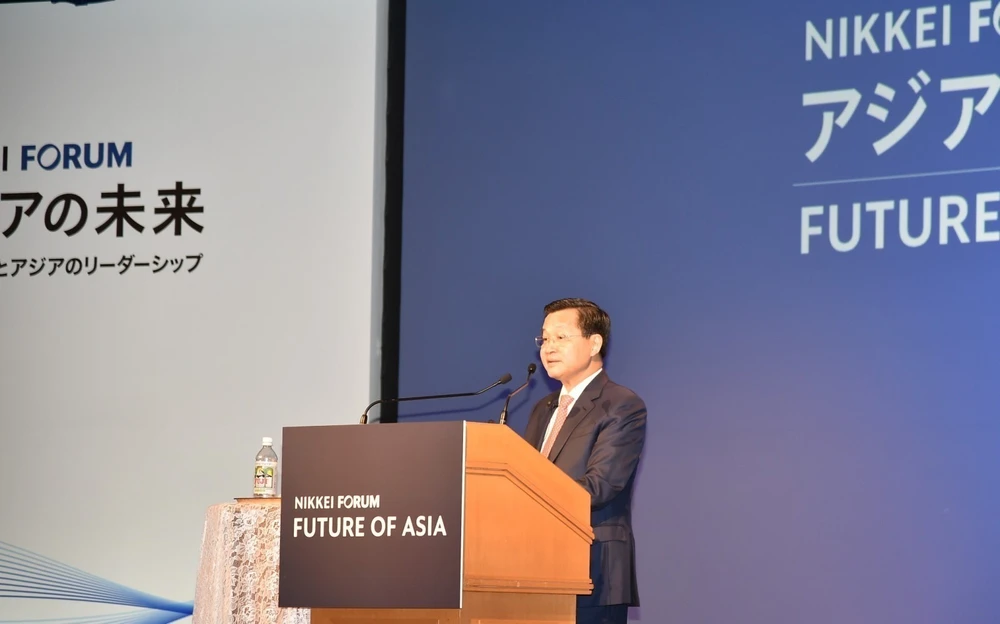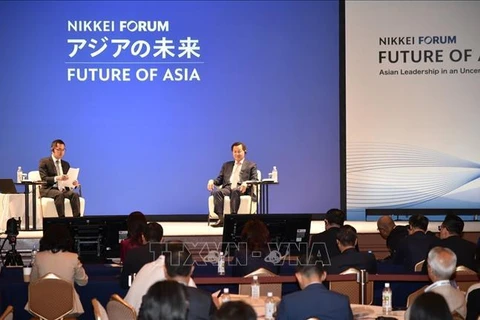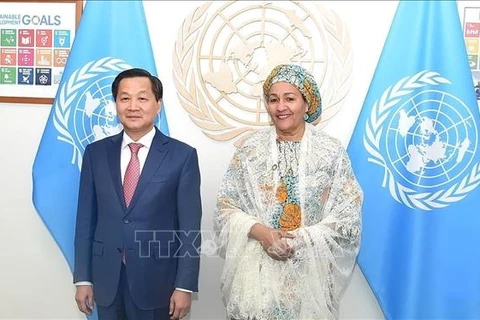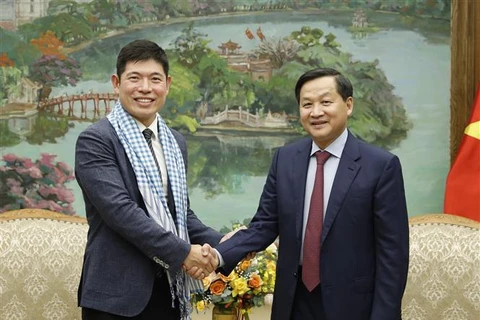
Tokyo (VNA) – The following is the full text of Deputy Prime Minister Le Minh Khai’s remarks at the 29th Future of Asia Forum that took place on May 23 in Tokyo, Japan.
“Mr. Hasebe Tsuyoshi, Nikkei President and CEO,
Esteemed Leaders,
Ladies and gentlemen,
On behalf of the Government of the Socialist Republic of Viet Nam, I am honored to deliver my remarks at the 29th Future of Asia Forum under the theme “Asian Leadership in an Uncertain World.”
I applaude Nikkei’s initiative to organize the Future of Asia Forum continuously over the past three decades. This important forum provides a platform for us to share perspectives and foster cooperation for sustainable development and prosperity in Asia.
At today’s Forum, I would like to present an outlook on some issues facing the global economy, what Asia can do to help address global challenges, and Viet Nam’s development orientations.
I. Emerging issues in the Asian and global economic landscape.
1. The world has been witnessing rapid and unpredictable changes, captured as “uncertain” in the Forum’s theme. Uncertainty nowadays covers many aspects of the international landscape, from geopolitics to the geo-economic situation, social issues, environment, climate change, and other non-traditional security challenges.
Following nearly three decades of continuous growth, the world’s economy is moving into a period of hardship and unpredictability with increasing risks. Many international organizations are raising alarms about a decade of low growth with stagnant productivity at the global scale.
I believe that the world economy is presented with far-reaching transformations and challenges. These include:
(i) The challenge of maintaining extensive, multi-layered economic integration, while securing national strategic autonomy,
(ii) The challenge of reforming global governance system to provide an enhanced role and greater voice for developing countries,
(iii) The challenge of effectively managing emerging technologies, particularly artificial intelligence, and new energies, to ensure security, equality, inclusive growth, and the narrowing of development gap,
(iv) The challenge of resource mobilization to tackle global issues such as the implementation of Sustainable Development Goals (SDGs), climate change adaptation, and green transition.
The world today stands at a pivotal juncture. We have no other choice but to embrace sustainable, inclusive growth driven by actions and breakthroughs, to forge new partnerships resting on international solidarity, respect for equality, multilateralism, and international law.
2. Despite the volatility and uncertainty in the global situation and economy, Asia continues to maintain robust and stable growth as reflected by the following three highlights:
First, while the global economy witnesses instability, along with slow and uneven recovery, Asia continues to be a growth engine for the global economy with the projected rate of 4.5% in 2024, which is 50% higher than the global average.
Second, while some regions suffer from widespreading, escalating conflicts, Asia remains free of armed conflicts for many decades, which is a prerequisite for development. Within Asia, the ASEAN Community has been deepening its comprehensive integration. ASEAN has always been taking a leading role and asserting its centrality in various important mechanisms, such as the ARF, ASEAN+3, and the East Asia Summit (EAS). This is instrumental in safeguarding peace and stability with greater engagement of ASEAN’s partners in dialogue, cooperation, and trust building processes in the region.
Third, amidst rising politicized economic cooperation and decoupling, fragmented supply chains, Asia remains a convergence of trade, an FTA network hub, and a center for regional and inter-regional economic linkages. According to the WTO, Asia will add 1.3 percentage points to the global export growth, which is projected at 2.9% in 2024. The RCEP and the CPTPP continue to be a role model as the world’s largest inter-regional FTAs. Asia is pioneering in advancing green growth with initiatives like Japan’s Asia Zero Emission Community (AZEC), and those on digital transformation and climate change action.
II. Asia’s contribution to addressing global challenges:
Ladies and gentlemen,
3. Looking back on the past three decades, our continent has endured the Asian financial crisis in 1997, the global financial crisis in 2008 - 2009, and the Covid-19 pandemic. Asia has successfully sailed through difficulties, addressed challenges, and emerged stronger. Today, we can affirm that Asia, encompassing major economies and large-scale markets, not only represents a growth pole, but also presents itself as a growth model, taking the lead in many novel areas. Asia is capable of mastering its own destiny, and at the same time, fostering positive impacts on the growth prospects of other regions and the world.
As an Asian nation emerging from wars, Viet Nam treasures independence, peace, and freedom. Having endured poverty, diplomatic isolation, and embargoes, Viet Nam thoroughly understands the values of economic development and international solidarity. As such, we seek to foster cooperation with our partners towards the common goal of development and prosperity.
Guided by the motto, “to travel swiftly, go alone; to journey far, go together”, I would like to propose three assurances and three enhancements for Asia’s future development and strengthened role.
On three assurances:
- First, ensure a peaceful and stable environment as the premise for cooperation and development. It is incumbent upon all countries to respect the United Nations Charter and international law, particularly the 1982 United Nations Convention on the Law of the Sea. Disputes must be settled by peaceful means; conflicts must be resolved; and cooperation and dialogue must prevail over confrontation.
- Second, ensure that benefits of free trade and investment are distributed widely and equally among countries, thereby strengthening the confidence in multilateral economic cooperation with the WTO at the core. More than ever, Asia needs to reaffirm its commitment to market openness and foster cooperation to maintain a stable and sustainable supply chain. Free trade and investment will help Asian economies raise their competitiveness and remain a top choice for international investors.
- Third, ensure that common challenges are addressed by embracing international cooperation, multilateralism, inclusiveness and comprehensiveness. No one is left behind in our region’s future development.
On three enhancements:
- First, enhance and reinforce the adaptability and resilience of our economies and businesses. Through multilateral frameworks, regional economies need to strengthen information sharing, macro policy coordination, and timely promote regional and inter-regional economic cooperation initiatives. In addition, strengthen cooperation on food security, energy security, cyber security, and trade connectivity to diversify supply sources in the interest of regional economic security.
- Second, enhnace the effectiveness of resource utilization to bolster new growth engines in green economy and digital economy. Regional economies need to be prepared for new development trends through the following measures:
(i) Participating in shaping standards and principles for managing cutting-edge technologies, particularly artificial intelligence, quantum computing, and new energies,
(ii) Conducting research, piloting initiatives, and replicating successful models of green economy, circular economy, and sharing economy,
(iii) Promoting the implementation of regional initiatives such as Japan’s AZEC initiative, ASEAN Digital Economy Framework Agreement, ASEAN Blue Economy Framework, and ASEAN Strategy for Carbon Neutrality.
In this process, I call on developed countries to provide financial support and facilitate technology transfer to developing countries. At the same time, developing countries need support in capacity building to fulfill their commitments to green growth, emissions reduction, and climate change response. In addition, their labor force needs to be reskilled and upskilled.
- Third, enhance B2B cooperation, people-to-people exchanges, and cultural, tourism exchanges
Faced with common challenges in the region, I urge the business community to join hands with governments in realizing commitments to sustainable development, pursuing long-term economic, environmental, and social goals, increasing investment in science, technology, and human resources, and building inclusive and resilient communities. This is an opportunity for Asian businesses to position themselves in global supply chains and establishing their business values and brand.
No matter how modern technologies become, people are always the owner, the goal, and the driving force of the cooperation and development. For that reason, besides solving existing problems, we need to pay attention to sowing the seeds for the future of regional cooperation. I hope leaders will support and promote youth exchange programs (as Viet Nam has implemented very effectively with Japan, the Republic of Korea, China, and ASEAN partners) to strengthen mutual understanding and nurture strategic trust for the next generations.
Asia has rich and beautiful traditions and cultures that can be showcased to international friends via enhancing tourism cooperation and cultural exchange with countries both within and outside the region. Some ASEAN countries have launched the “one-trip, multi-destination” initiative to promote tourism and showcase their cultural richness and the people’s inner beauty.
Japan plays an indispensible role in the the future development of Asia. As one of the most developed economies in the region, Japan has made significant contributions to regional cooperation and development over the past decades. The world is entering a new period marked by the trend of digital transformation and green transition. Against this backdrop, with its strengths in capital, technology, and governance, I am confident that Japan will continue to play a leading role in advancing regional economic cooperation and development, while supporting and partnering with countries in Asia and ASEAN on this journey.
III. Viet Nam’s development priorities and orientations and its cooperation with Japan
Ladies and gentlemen,
In tandem with Asia’s overarching growth, Viet Nam has recorded remarkable changes and proudly serves as the role model in several important aspects of development.
First, Viet Nam’s economy has grown by leaps and bounds in both quality and quantity. The scale of the economy expanded over 53-fold, from 8 billion USD in 1986 to 430 billion USD in 2023. Income per capita increased by around 28 times, from 150 USD in 1986 to over 4,200 USD in 2023. The restructuring of economic sectors is well under way, with focus given to the utilization of scientific and technological achievements and enhancement of Viet Nam’s competitiveness in the global value and production chain.
Second, social security and justice are guaranteed. People’s material and cultural life has been significantly improved. From a poor country where people lived in extreme difficulty with a poverty rate of 60%, Viet Nam has managed to fulfil the Millennium Development Goals, with the percentage of poor households according to multidimensional poverty standards dropping to 2%. Viet Nam has also become the world’s second-largest rice exporter, and been ranked, in terms of human development index, among the top economies at similar levels of development.
Third, Viet Nam has established itself as a paragon in the history of international relations for its efforts to overcome and address the consequences of war, build post-war diplomatic relations, open its economy, and engage in extensive international integration. Having endured countless sufferings and losses from various wars over the past century, we have since been steadfast and persevering in the spirit of “putting aside the past, bridging differences, upholding similarities, and striving forward to the future”. From a country under isolation and embargo from past wars, Viet Nam has established relations with 193 countries around the world, become strategic and comprehensive partners with 30 countries, including all five permanent members of the United Nations Security Council, seven G7 members, and sixteen G20 members. With 16 signed FTAs and three FTAs under negotiation, Viet Nam now emerges as an important gateway and linkage in global and regional supply chains, and as one of the top 20 international traders.
6. Going forward, Viet Nam is entering a new stage of development with the vision of becoming a developed country by 2045. To this end, Viet Nam focuses on implementing three strategic breakthroughs in economic institutions, infrastructure, and human resources. We will continue to seek robust innovation in mindset, and holistically build and improve our institutions for sustainable development in economic, political, cultural, social, and environmental matters. We will also strive to tap into Viet Nam’s full potential and resources to add fresh impetus to the nation’s rapid and sustainable development.
We remain determined to build an independent and self-reliant economy while engaging in international integration in an active, extensive, substantive, and effective manner. These endeavors are guided by the following principles: utilizing inner strength as a fundamental, long-term, and decisive factor, while seeking breakthroughs using external support, and recognizing the people as the heart, the actor, the goal, the driver, and the resource of development. Viet Nam does not sacrifice social equality and progress, and the environment for mere economic gains.
Viet Nam pursues the consistent foreign policy of independence, self-reliance, peace, friendship, cooperation, development, and multilateralization and diversification in external relations. Viet Nam also actively engages in comprehensive and extensive international integration, and adopts a “four nos” defense policy. In addition, we are stepping up efforts to build a strong and transparent Party and resolutely combat violations and wrongdoings to consolidate the people’s trust in the Party and State, as well as in the political and legal system. Moreover, we are bolstering discipline within the state apparatus while maintaining and building upon political stability for national development. This judicious guideline of the Communist Party of Viet Nam has earned the trust and support of the Vietnamese people and the international community.
To realize the proposed development goals, we hope that partners and businesses will continue to work with and support Viet Nam in such efforts. With priority given to quality, efficiency, advanced technology, and environmental protection, Viet Nam selectively attracts investment projects in industries and areas concerning advanced technology, innovation, semiconductors, renewable energy, and development of financial and innovation centers.
For its part, Viet Nam remains committed to creating favorable conditions for and protecting the legal and legitimate rights and interests of enterprises and investors who are engaging in long-term, effective, and sustainable operation in our country. We consider the success of the business community as Viet Nam’s own success. The Government of Viet Nam will always work with businesses and investors in the coming journey to together solve challenges, turn risks into opportunities, and achieve rapid and sustainable progress.
Ladies and gentlemen!
These aforementioned achievements can be attributed to Viet Nam’s efforts to both best harness domestic resources and effectively utilize the assistance of international partners, including Japan. I am confident that the Comprehensive Strategic Partnership for Peace and Prosperity in Asia and the World between Viet Nam and Japan will be actively implemented, thereby bringing about tangible benefits for the people, and contributing to the common peace, stability, and prosperity in the region.
There is vast untapped potential for economic cooperation between Viet Nam and Japan. The business communities of both countries need to actively leverage this new partnership, bolster economic connectivity, and collaborate to ensure economic security and maintain stable supply chains. Priority should be given to cooperation in high-quality human resource development in emerging industries and digital technology.
Our great President Ho Chi Minh once said, “Viet Nam constitutes a part of the Asian family.” He regarded Viet Nam as an inseparable member whose journey and destiny are closely intertwined with the “larger Asian family”. It is Viet Nam’s responsibility to contribute to regional peace, stability, and development.
Today, equipped with better conditions and a greater wealth of experience, Viet Nam wishes to further harness its role as “a good friend, a reliable partner, and a responsible member” of the region and international community. We shall contribute to tackling common global challenges and fostering rapid, sustainable, and inclusive development in the region and the world.
I firmly believe that with the fundamental values of diversity, dynamism, and resilience, Asia will continue to make steady progress on its future path, pen new triumphant stories, and accomplish oustanding missions in the 21st century.
I wish all distinguished delegates good health, happiness, and greater success!
May the Forum be a great success!
Thank you very much! Arigatou gozaimasu!






















